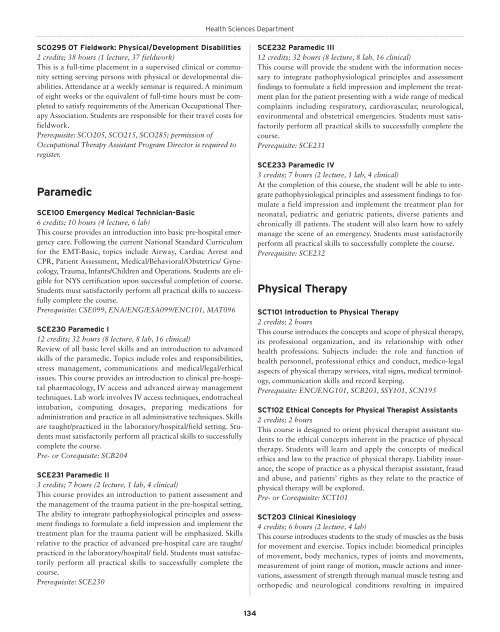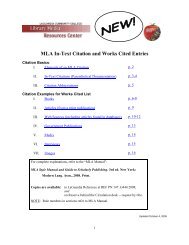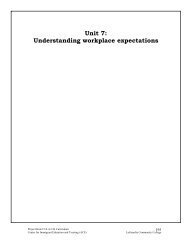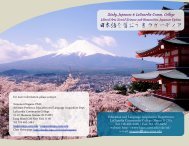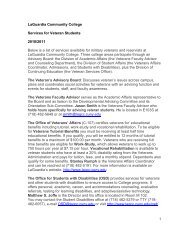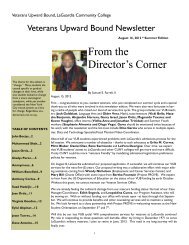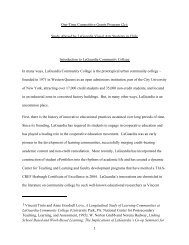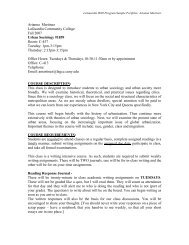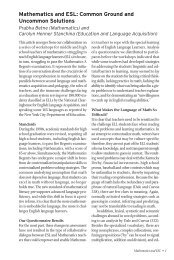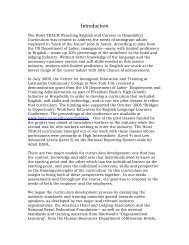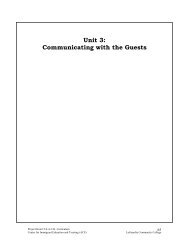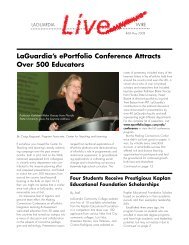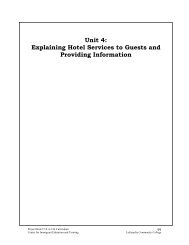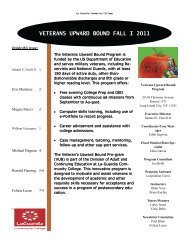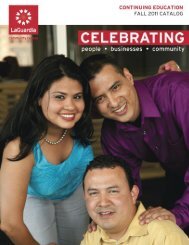COURSE INDEX - LaGuardia Community College
COURSE INDEX - LaGuardia Community College
COURSE INDEX - LaGuardia Community College
You also want an ePaper? Increase the reach of your titles
YUMPU automatically turns print PDFs into web optimized ePapers that Google loves.
Health Sciences Department<br />
SCO295 OT Fieldwork: Physical/Development Disabilities<br />
2 credits; 38 hours (1 lecture, 37 fieldwork)<br />
This is a full-time placement in a supervised clinical or community<br />
setting serving persons with physical or developmental disabilities.<br />
Attendance at a weekly seminar is required. A minimum<br />
of eight weeks or the equivalent of full-time hours must be completed<br />
to satisfy requirements of the American Occupational Therapy<br />
Association. Students are responsible for their travel costs for<br />
fieldwork.<br />
Prerequisite: SCO205, SCO215, SCO285; permission of<br />
Occupational Therapy Assistant Program Director is required to<br />
register.<br />
Paramedic<br />
SCE100 Emergency Medical Technician-Basic<br />
6 credits; 10 hours (4 lecture, 6 lab)<br />
This course provides an introduction into basic pre-hospital emergency<br />
care. Following the current National Standard Curriculum<br />
for the EMT-Basic, topics include Airway, Cardiac Arrest and<br />
CPR, Patient Assessment, Medical/Behavioral/Obstetrics/ Gynecology,<br />
Trauma, Infants/Children and Operations. Students are eligible<br />
for NYS certification upon successful completion of course.<br />
Students must satisfactorily perform all practical skills to successfully<br />
complete the course.<br />
Prerequisite: CSE099, ENA/ENG/ESA099/ENC101, MAT096<br />
SCE230 Paramedic I<br />
12 credits; 32 hours (8 lecture, 8 lab, 16 clinical)<br />
Review of all basic level skills and an introduction to advanced<br />
skills of the paramedic. Topics include roles and responsibilities,<br />
stress management, communications and medical/legal/ethical<br />
issues. This course provides an introduction to clinical pre-hospital<br />
pharmacology, IV access and advanced airway management<br />
techniques. Lab work involves IV access techniques, endotracheal<br />
intubation, computing dosages, preparing medications for<br />
administration and practice in all administrative techniques. Skills<br />
are taught/practiced in the laboratory/hospital/field setting. Students<br />
must satisfactorily perform all practical skills to successfully<br />
complete the course.<br />
Pre- or Corequisite: SCB204<br />
SCE231 Paramedic II<br />
3 credits; 7 hours (2 lecture, 1 lab, 4 clinical)<br />
This course provides an introduction to patient assessment and<br />
the management of the trauma patient in the pre-hospital setting.<br />
The ability to integrate pathophysiological principles and assessment<br />
findings to formulate a field impression and implement the<br />
treatment plan for the trauma patient will be emphasized. Skills<br />
relative to the practice of advanced pre-hospital care are taught/<br />
practiced in the laboratory/hospital/ field. Students must satisfactorily<br />
perform all practical skills to successfully complete the<br />
course.<br />
Prerequisite: SCE230<br />
SCE232 Paramedic III<br />
12 credits; 32 hours (8 lecture, 8 lab, 16 clinical)<br />
This course will provide the student with the information necessary<br />
to integrate pathophysiological principles and assessment<br />
findings to formulate a field impression and implement the treatment<br />
plan for the patient presenting with a wide range of medical<br />
complaints including respiratory, cardiovascular, neurological,<br />
environmental and obstetrical emergencies. Students must satisfactorily<br />
perform all practical skills to successfully complete the<br />
course.<br />
Prerequisite: SCE231<br />
SCE233 Paramedic IV<br />
3 credits; 7 hours (2 lecture, 1 lab, 4 clinical)<br />
At the completion of this course, the student will be able to integrate<br />
pathophysiological principles and assessment findings to formulate<br />
a field impression and implement the treatment plan for<br />
neonatal, pediatric and geriatric patients, diverse patients and<br />
chronically ill patients. The student will also learn how to safely<br />
manage the scene of an emergency. Students must satisfactorily<br />
perform all practical skills to successfully complete the course.<br />
Prerequisite: SCE232<br />
Physical Therapy<br />
SCT101 Introduction to Physical Therapy<br />
2 credits; 2 hours<br />
This course introduces the concepts and scope of physical therapy,<br />
its professional organization, and its relationship with other<br />
health professions. Subjects include: the role and function of<br />
health personnel, professional ethics and conduct, medico-legal<br />
aspects of physical therapy services, vital signs, medical terminology,<br />
communication skills and record keeping.<br />
Prerequisite: ENC/ENG101, SCB203, SSY101, SCN195<br />
SCT102 Ethical Concepts for Physical Therapist Assistants<br />
2 credits; 2 hours<br />
This course is designed to orient physical therapist assistant students<br />
to the ethical concepts inherent in the practice of physical<br />
therapy. Students will learn and apply the concepts of medical<br />
ethics and law to the practice of physical therapy. Liability insurance,<br />
the scope of practice as a physical therapist assistant, fraud<br />
and abuse, and patients’ rights as they relate to the practice of<br />
physical therapy will be explored.<br />
Pre- or Corequisite: SCT101<br />
SCT203 Clinical Kinesiology<br />
4 credits; 6 hours (2 lecture, 4 lab)<br />
This course introduces students to the study of muscles as the basis<br />
for movement and exercise. Topics include: biomedical principles<br />
of movement, body mechanics, types of joints and movements,<br />
measurement of joint range of motion, muscle actions and innervations,<br />
assessment of strength through manual muscle testing and<br />
orthopedic and neurological conditions resulting in impaired<br />
134


